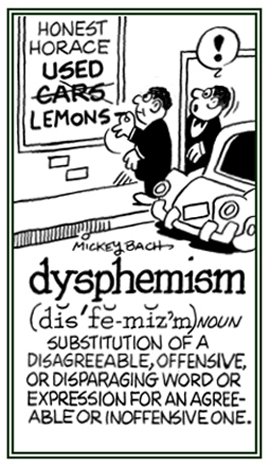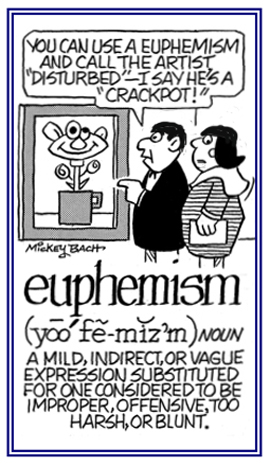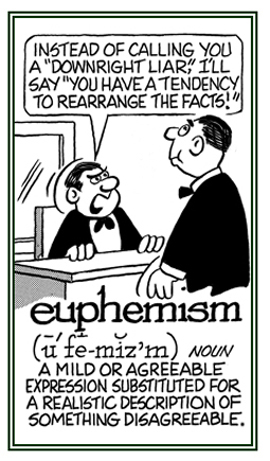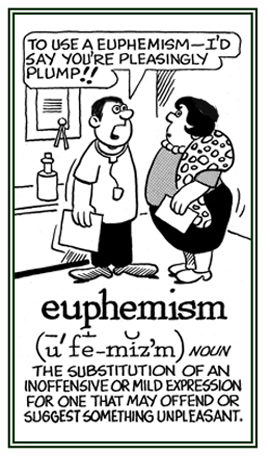-phemia, -phemic, -phemism, -pheme, -phemy
(Greek: speak, talk; speech)
Obscene or filthy language in speech.
1. An offensive expression or word that is deliberately substituted for a neutral one: Ted's brother used a dysphemism when he was talking about visiting a friend who was in a "loony bin" instead of saying in the "mental hospital".
2. Any physical impairment or problem when speaking: Jan was so chilly from being in the winter storm that she could only explain what happened with dysphemisms of stutters.

© ALL rights are reserved.
Go to this Word A Day Revisited Index
2. Any physical impairment or problem when speaking: Jan was so chilly from being in the winter storm that she could only explain what happened with dysphemisms of stutters.

Go to this Word A Day Revisited Index
so you can see more of Mickey Bach's cartoons.
A term for substituting a mild, indirect, or vague term for one that is considered harsh, blunt, or offensive.
euphemise (verb), euphemises; euphemised; euphemising
A British spelling version of euphemize.
1. A mild or pleasant word, or phrase, which is used in place of one that might be considered too direct, too harsh, too unpleasant, or too offensive: One example of a euphemism is to use "eliminate" instead of "kill".
2. The use of a word, or phrase, that is more neutral, vague, or indirect to replace a direct, harsh, unpleasant, or an insulting term: Instead of Gordon saying that his wife was just too fat, he used a euphemism mentioning that she just had a lot of “love handles”!

© ALL rights are reserved.

© ALL rights are reserved.

© ALL rights are reserved.
Go to this Word A Day Revisited Index
2. The use of a word, or phrase, that is more neutral, vague, or indirect to replace a direct, harsh, unpleasant, or an insulting term: Instead of Gordon saying that his wife was just too fat, he used a euphemism mentioning that she just had a lot of “love handles”!



Go to this Word A Day Revisited Index
so you can see more of Mickey Bach's cartoons.
Someone who makes a substitution of an agreeable, an acceptable, or inoffensive expression for another one that may offend or suggest something unpleasant.
euphemistic (adjective), more euphemistic, most euphemistic
A reference to the use of an acceptable word or phrase to avoid saying another word or phrase that may be unpleasant or disrespectful.
euphemistical (adjective), more euphemistical, most euphemistical
Characterized as a softer or more pleasant expression to describe someone or something.
euphemistically (adverb), more euphemistically, most euphemistically
The substitution of a harsh or blunt expression for one that is mild, indirect, or vague.
euphemize (verb), euphemizes; euphemized; euphemizing
To avoid saying, or writing, something direct, harsh, unpleasant, or offensive by using milder or more indirect language.
A reference to anyone who makes a substitution of an agreeable or inoffensive expression for one that may offend or suggest something unpleasant.
1. Any of a set of written symbols, letters, or combinations of letters that represent the same sound, e.g. “f” in fat, “ph” in photo, and “gh” in tough.
2. A written symbol that is used to represent speech.
2. A written symbol that is used to represent speech.
graphemic (adjective), more graphemic, most graphemic
In linguistics, the study of systems of writing and their relationship to the systems of the languages they represent.
Cross references of word families related directly, or indirectly, to: "talk, speak, speech; words, language; tongue, etc.":
cit-;
clam-;
dic-;
fa-;
-farious;
glosso-;
glotto-;
lalo-;
linguo-;
locu-;
logo-;
loqu-;
mythico-;
-ology;
ora-;
-phasia;
phon-;
phras-;
Quotes: Language,Part 1;
Quotes: Language, Part 2;
Quotes: Language, Part 3;
serm-;
tongue;
voc-.
Cross references of word families that are related directly, or indirectly, to: "divination, diviner; seer, soothsayer, prophecy, prophesy, prophet": augur-; auspic-; fa-, fate; Fates in action; futur-; -mancy; omen; sorc-, sorcery; vati-.


